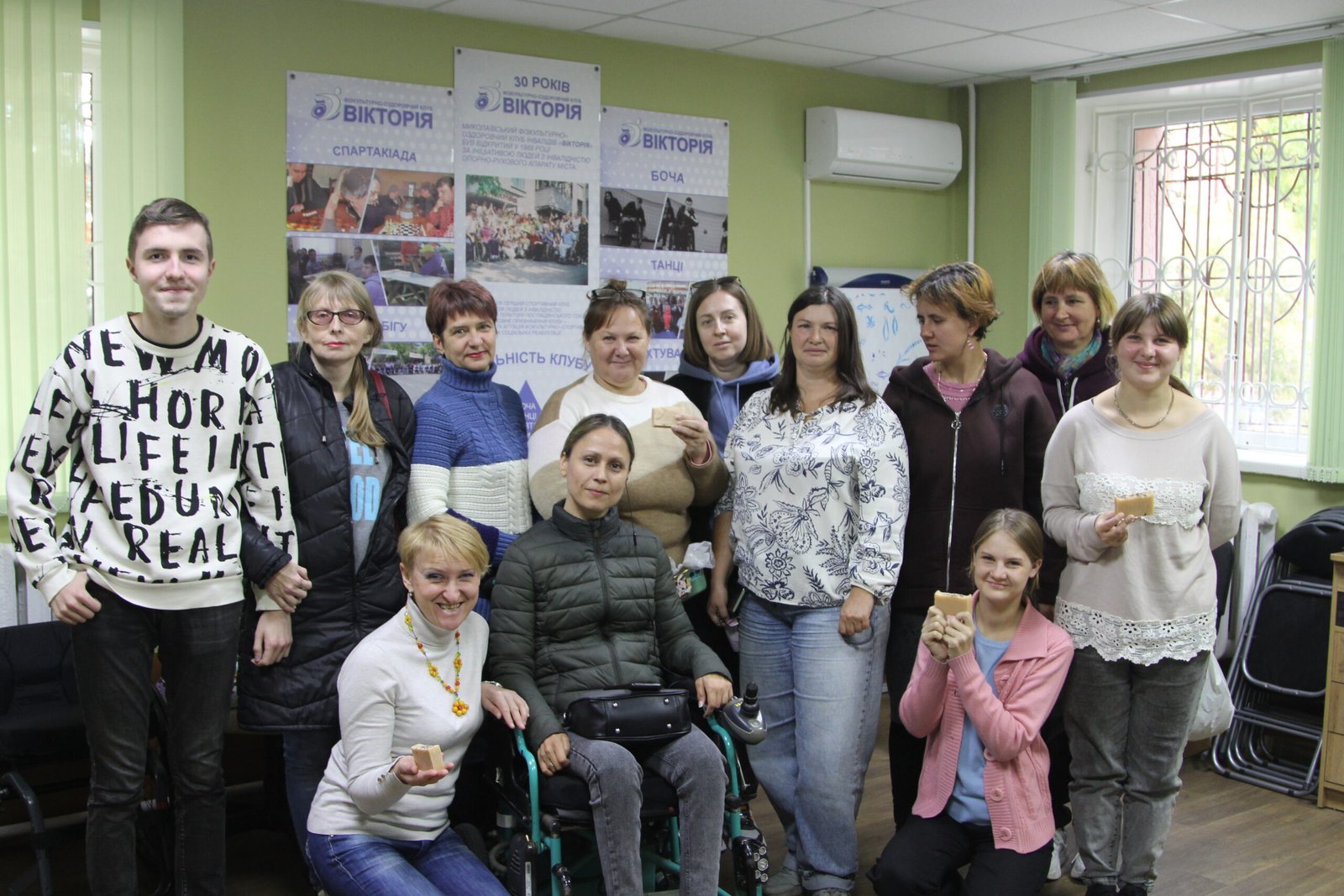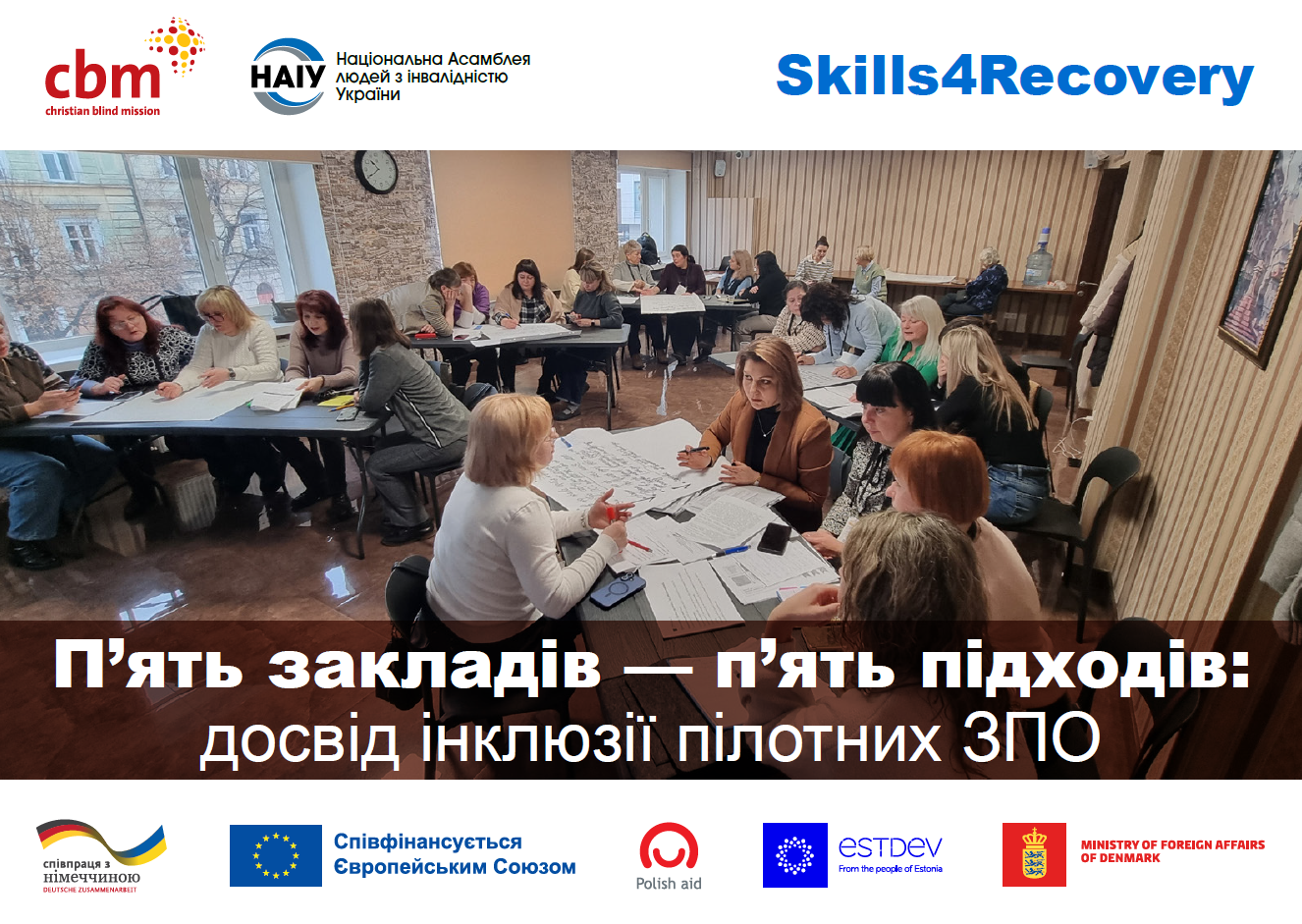A webinar on the new rules for determining disability, organized by the Resource Center of the National Assembly of People with Disabilities of Ukraine as part of the Rehab4U project, attracted a large audience. The questions they asked concerned not only the algorithm for completing documents, but also many other problems that people with disabilities face today.
Here is an overview of the most pressing questions and comments from experts: the webinar speaker, Inna Borisova, an expert from the Ministry of Health of Ukraine in the field of "Medical and Social Expertise," as well as lawyers from the NAPD.
- What is the mechanism for assessing the condition of military and civilian personnel in order to obtain disability status if their health has deteriorated due to injuries sustained as a result of Russian military aggression?
– Civilians who have suffered as a result of the war (mainly mine and explosive injuries), as well as former and current military personnel, undergo examination by expert teams located in the nearest healthcare facilities. Former members of the Security Service of Ukraine and intelligence agencies, on the other hand, undergo examination only at the Assessment Center in Dnipro. This rule applies to both enlisted personnel and officers.
- I need a duplicate of the MSEC decision. The clinic said that all cases regarding the granting of disability status in paper form have been digitized, and the documents themselves have been destroyed. Who should I contact in this situation?
– Actually, this is not the case. Only the paper documents of those applicants who had previously submitted applications to the medical and social expert commission were digitized, but by the date on which their cases were scheduled to be considered, the MSEC had already ceased its work. In such cases, decisions were made by expert teams based on digitized documents received from the MSEC.
The paper archive (which is huge) was not destroyed, but the applicants' files contained therein were transferred for storage to healthcare institutions where expert teams work.
Therefore, if a person with a disability needs a duplicate of the decision on the establishment of disability or, for example, an extract from the decision on the previously established percentage of loss of working capacity, they can submit a request to the healthcare institution where their case is stored and obtain the document from the expert team.
- How to obtain a duplicate MSEC certificate if the original is lost?
– The MSEC certificate was issued in triplicate. The first copy was given to the patient. If they lost this document, it is important to know about the other two originals. The second is kept in the applicant's paper file. Therefore, you can contact the expert team that assessed you and request a duplicate. The third is kept at the Ministry of Social Policy institution that calculates social benefits for people with disabilities. You can also obtain a duplicate of the certificate at this institution.
- I am undergoing treatment in Switzerland: I have been diagnosed with breast and lung cancer and have a Group II disability. In October 2025, I will have to undergo a re-examination. Is this necessary in view of the recent changes in legislation?
No, you do not need to undergo a re-examination. On June 4, 2025, amendments to Cabinet of Ministers Resolution No. 641 came into force, according to which people with disabilities resulting from cancer are exempt from mandatory re-examination. For patients who are abroad, this is a significant relief, because previously, documents sent from another country had to be translated into Ukrainian and notarized, which meant significant additional costs. Now there is no such requirement, so you can undergo treatment and know that the state guarantees your payments.
- A child with a disability was assigned a disability group after assessment. Subsequently, after suffering a stroke, the child's condition worsened, and the parents no longer agree with the previous conclusion. How should one proceed in such a situation?
– If parents believe that the condition of a child with a disability has worsened (for example, the child was previously assigned to disability group III, but due to illness, there are now grounds for assigning them to group II), they should contact their doctor. The doctor will examine the patient, review the documents provided, and refer the child for examination by a team of experts. If there are grounds for doing so, the disability group will be upgraded.
- Does a child with a disability since childhood (mental disorder) need to undergo a re-examination to establish permanent disability? We were told that permanent disability is only granted to patients with anatomical disorders.
– If a child was diagnosed with a disability in childhood due to a mental illness, they must undergo a re-examination after reaching the age of 18. The expert team can only assign a permanent disability group after the first examination if the patient has been recognized as a person or child with a disability for at least 10 years. This is provided for by Resolution of the Cabinet of Ministers No. 1338.
- What should parents do if their child has been denied permanent disability status and they believe this decision to be unjustified?
– If there are legal grounds, parents have the right to appeal such a decision. First of all, it is worth contacting the expert team and referring to the relevant clause of Resolution No. 1338, emphasizing that current legislation guarantees the child the right to obtain disability status indefinitely. If no agreement is reached, a written application can be submitted to the following address: 49005, Dnipro, Feodosia Makarevskogo Lane, 1-A. The complaint must be submitted in paper or electronic form within 40 calendar days from the date of receipt of the extract from the decision being appealed.
- A person with a disability (hearing impairment) was assigned to disability group III for a period of one year after reaching the age of 18. They said that this period would then be extended: first for five years, and then indefinitely. Why not assign this group indefinitely right away?
– This is a requirement of current legislation: disability for persons who are assigned to Group III for the first time is granted for a period of 1 year.
- If a child was diagnosed with a disability (hearing impairment) before the age of 18, does it automatically continue during martial law?
No. Upon reaching the age of majority, the status of "child with a disability" is revoked, and the person must undergo a re-examination to obtain "adult" disability status.
- I am a participant in the liquidation of the consequences of the Chernobyl accident, a pensioner, I have diabetes and receive insulin. Gangrene has developed in my big toe. They do not give me a disability group, saying that it will only be possible to do so after amputation of part of the limb. Is this explanation correct and where should I go?
– You can appeal the expert team's decision on the assessment results. The complaint must be submitted in person (or through an authorized representative) in paper form to the Center for Assessment of Functional Status, as well as in electronic form. To do this, you must contact the doctor who referred you for assessment. Please note that the complaint can be submitted within 40 calendar days from the date of receipt of the extract from the expert team's decision. If this deadline is missed for a valid reason, supporting documents must be provided.
- Is it necessary to refer a person with an orphan (rare) genetic disease – Marfan syndrome – for assessment? Resolution No. 1338 of the Cabinet of Ministers of Ukraine states that such patients are assigned to Group III indefinitely, without review. And which expert team should assess such a disease: a general or specialized one (in my case, the main symptoms are cardiological)? What should be done if, in our opinion, the commission's profile is determined incorrectly (they want to refer us to a traumatologist, although there are cardiological complications)?
– Resolution No. 1338 is often interpreted in different ways. In fact, the document states that disability is determined indefinitely if there are signs of disability. This means that you must first attend a meeting with a team of experts and obtain their conclusion.
The consequences of Marfan syndrome that lead to disability are assessed according to two main criteria: cardiac dysfunction or traumatic manifestations. If, in this case, cardiac dysfunction is the primary concern, the patient is referred to the ECOPFO cardiology team; if the main problem is joint mobility and related traumatic complications, the patient is referred to the traumatology team.
In practice, however, the difference in the choice of team profile does not significantly affect the assessment process. If, for example, during a trauma examination, doctors have questions about cardiac manifestations, they will invite a cardiologist. Conversely, if the cardiology team has questions about trauma, they will involve the appropriate specialist.
- Is it possible to insist on the selection of the expert team's profile? And is it possible to declare this before the commission is appointed: verbally or by submitting a written statement?
– Yes. A person can submit a written request in advance when they are referred for examination, or report this verbally immediately before the expert team begins its work. In this case, the commission's work will be postponed for 15 minutes and a doctor of the required specialty will be called in. Their conclusion will be recorded in the minutes and their signature will be confirmed electronically.
- I have hearing impairment, and my doctor recommended that I wear a hearing aid, but I cannot use it because it causes severe headaches. Because I refused to wear a hearing aid, I was denied permanent disability status. Is this legal?
– According to Resolution No. 1338 of the Cabinet of Ministers of Ukraine, permanent disability is only granted when all possible treatment methods and measures have been exhausted. Hearing aids are also included in the list of medical devices. In other words, if a patient consciously refuses treatment, they lose their right to be granted disability status.
It is a completely different matter if a person cannot use the device for reasons beyond their control, as cases of intolerance to medical or rehabilitation devices are quite common. One such case involved a patient who had an electrostimulator implanted 11 times, but the device failed to take root each time...
In your situation, you need a conclusion from an audiologist stating: "The device is not indicated, but the patient cannot hear." Such a document is the basis for establishing permanent disability.
- My family doctor said that applying for disability benefits is very expensive. Is this true, and where can I find the funds if my income is low?
– No, that's not true. The determination of disability in Ukraine is free of charge. If a doctor demands payment or informs you of the need for additional expenses, you can file a written complaint with the Ministry of Health at: ez@moz.gov.ua or call the Ministry of Health hotline at 0-800-801-333, providing the name and surname of the medical worker and the name of the medical institution where she works.
NAPD Resource Centre::
Address: Office 109, 8/5A Reitarska St., Kyiv
Appointments by appointment: +38(044)2796182, +38(095)9091413
or by email: hubnapd@gmail.com
This material is made possible by the generous support of the American people through the United States Agency for International Development (USAID). The contents are the responsibility of Momentum Wheels for Humanity and do not necessarily reflect the views of USAID or the United States Government.








